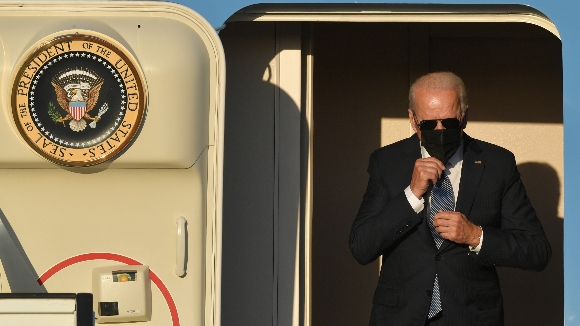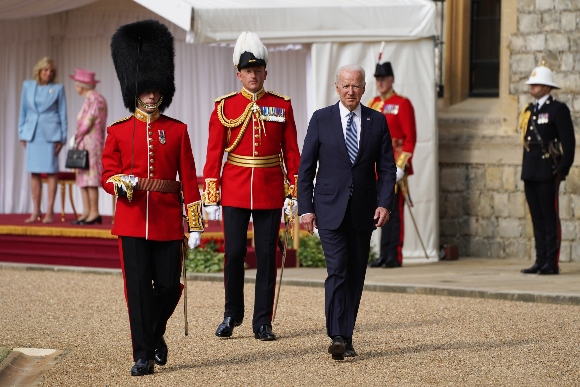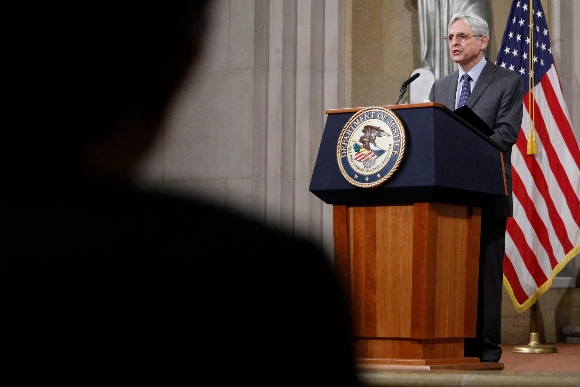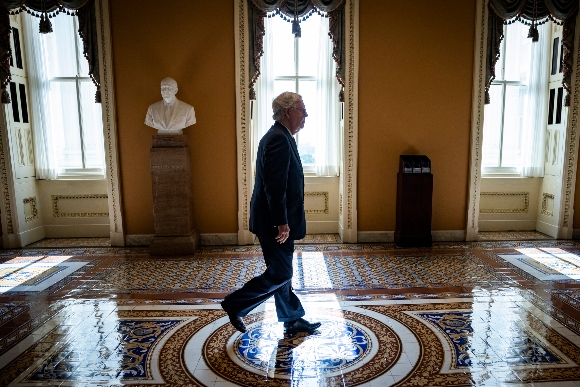The Hill’s Morning Report – Biden-Putin meeting to dominate the week


Welcome to The Hill’s Morning Report. It is Monday! We get you up to speed on the most important developments in politics and policy, plus trends to watch. Alexis Simendinger and Al Weaver are the co-creators. Readers can find us on Twitter @asimendinger and @alweaver22. Please recommend the Morning Report to friends and let us know what you think. CLICK HERE to subscribe!
Total U.S. coronavirus deaths as of this morning: 599,769.
As of today, 52.4 percent of the U.S. population has received at least one dose of a COVID-19 vaccine and 43.4 percent is fully vaccinated, according to the Bloomberg News global vaccine tracker.
President Biden’s summit with Russian President Vladimir Putin on Wednesday is expected to replay a consistently adversarial relationship between the two men, both veterans of the rise of nuclear superpowers and decades of shifting politics inside their respective governments.
Biden is tough in his public assessments of Putin, telling the Russian leader he believed he has “no soul” during a meeting in 2011 when he was vice president, a riff on the statement in 2001 by former President George W. Bush’s that he got a “sense of [Putin’s] soul.” This year, Biden affirmed during an interview that he views Putin as a “killer.”
Secretary of State Antony Blinken says the United States seeks a “more stable and predictable” relationship with Russia, arguing that Biden wanted to meet with Putin to be candid face to face while calling for an end to Russia’s malign conduct, including hostilities with Ukraine and the annexation of Crimea in 2014, the poisoning and imprisonment of Russian dissident Alexei Navalny, and the cyber thefts and ransomware attacks aimed at the United States.
“He is very blunt without being overly emotional. When it comes to Putin, he always knows what he is dealing with,” said Evelyn Farkas, who served as deputy assistant secretary of Defense for Russia, Ukraine and Eurasia under the Obama administration (The Hill).
The public debate in Washington over the weekend was whether the Biden administration has ideas or tools that will be more effective in dealing with Putin, who at age 68 has ruled Russia for more than 17 years.
CNN: Putin says he is willing to extradite cyber criminals to the United States on a reciprocal basis, according to TASS, the state-run news outlet.
The United States in the past tried rewarding Russia with recognition and a place at the international table. Later on when carrots were replaced by sticks, the Obama administration leaned on sanctions and rebukes when Russia ignored warnings from the West and invaded Crimea. Former President Trump used flattery and unusual expressions of public trust in Putin even as Trump’s top officials heaped criticism and sanctions on Russia following its interference in the 2016 election.
Putin, during a 90-minute NBC News interview that continues to air today, called Biden “radically different from Trump because President Biden is a career man. He has spent virtually his entire adulthood in politics.” The former KGB foreign intelligence officer, who demurred at being called a killer, said he thinks he can work with Biden.
Biden on Sunday said he agrees with Putin that relations between the U.S. and Russia are “at a low point.” He defended his decision to skip a joint press conference with the Russian president at the end of their summit in Geneva, arguing he and his counterpart can separately describe their conversation and make their views known (CNN and The Hill).
The president, who concluded his participation in the Group of Seven (G-7) summit in the United Kingdom and met with Queen Elizabeth II at Windsor Castle on Sunday, is in Brussels today for NATO meetings and will meet on the sidelines with Turkish President Recep Tayyip Erdoĝan. The Hill’s Laura Kelly explains what to watch. Biden returns to Washington on Wednesday.
The New York Times: Erdoĝan softens his stance ahead of his meeting with Biden.
The New York Times: G-7 leaders offer a united front, but cracks are clear.
The Hill’s upshot on the Sunday shows: Biden foreign policy in focus.

LEADING THE DAY
MORE ADMINISTRATION: The Justice Department during the Trump years not only secretly sought the email and phone logs of U.S. journalists and at least two Democratic lawmakers who were investigating Trump but also subpoenaed from Apple in 2018 information about Trump’s first White House counsel, Don McGahn, and barred Apple from disclosing that fact to McGahn, the West Wing attorney who represented the presidency, The New York Times reported on Sunday.
The New York Times: McGahn was a source for The Washington Post in 2018 while explaining a nuance of a 2017 encounter with Trump, also disclosed by The New York Times and denied by the president, in which Trump sought McGahn’s help to oust former special counsel Robert Mueller. McGahn in 2017 did not heed the president’s entreaty.
The drip, drip, drip of disclosures about the Trump administration’s efforts to obtain information in secret about a wide range of targets has sparked a new internal inspector general investigation at the Biden-led Justice Department, prompted an emergency meeting with Attorney General Merrick Garland and news media executives today, and inspired demands in Congress for sworn testimony from former attorneys general. Some Democrats in Congress described the department’s clandestine actions, apparently in search of unauthorized leaks, as an abuse of power, a serious breach between the legislative and executive branches, and potentially a trampling of the First Amendment.
The Justice Department, now serving a successor administration, has not publicly explained why Apple was being ordered to hand over subpoenaed data. The department has also not explained why the request was so broad, who approved it, and what was being investigated.
Former Attorney General William Barr told Politico during an interview on Friday that while he was attorney general, he was “not aware of any congressman’s records being sought in a leak case.” He added that Trump never encouraged him to zero in on the Democratic lawmakers. Former Deputy Attorney General Rod Rosenstein has said something similar about being unaware of the moves (CNN).
Lawmakers want to know if the top law enforcement officials in the department for four years were truly unaware of the subpoenas to Apple, who else may have been targeted and who inside the government reviewed the information disclosed by the tech giant in the context of a government search for leaks.
Apple and other tech giants such as Google and Microsoft are in an uncomfortable position between law enforcement, the courts and the customers whose privacy they have promised to protect. The number of government and court-ordered requests for data has soared in recent years to thousands a week, according to The New York Times.
Left holding the rubble is Garland, whose department continued some of the sleuthing after Biden became president (The New York Times).
The Hill: Garland sparks anger with willingness to side with Trump.
House Speaker Nancy Pelosi (D-Calif.) told CNN on Sunday that subpoenaing tech companies for account data of lawmakers, their staffs and family members was a step that “goes even beyond Richard Nixon,” adding, “Richard Nixon had an enemies list. This is about undermining the rule of law.”
The Speaker said a Justice Department probe into the matter is “not a substitute for what we must do in the Congress,” adding that the House would investigate.

> The tax man cometh? ProPublica’s recent report based on confidential tax returns describing how some of the wealthiest Americans pay zero in federal taxes set members of Congress on edge. So did a Sunday front-page New York Times article focused on how private equity firms and their employees and partners avoid hundreds of billions of dollars in taxes each year, in part because the IRS, outgunned and outlobbied, does not audit private equity interests aggressively. The controversy about how the wealthiest corporations and individuals are able to dodge the IRS, either under law and advantageous loopholes or because agency auditors are poorly trained and understaffed to deal with complex firms, is animating members of Congress.
“If you’re a wealthy cheat in a partnership, your odds of getting audited are slightly higher than your odds of getting hit by a meteorite,” Senate Finance Committee Chairman Ron Wyden (D-Ore.) said during a hearing last week. “For the sake of fairness and for the sake of the budget it makes a lot more sense to go after cheating by the big guys than focus on working people,” he added.
As The Hill’s Naomi Jagoda reports, Republican lawmakers are critical of Biden’s push to increase IRS resources to catch the wealthiest and most sophisticated tax dodgers. The New York Times reports that the White House is “already backing down from some of its most ambitious proposals” to increase the IRS budget. GOP lawmakers, eager to blame the agency, also howl that ProPublica obtained private tax data about billionaires’ tax avoidance.
> U.S. ambassador vacancies: The Hill Brett Samuels pulls back the curtain following the G-7 summit on the range of top diplomatic posts abroad that have no U.S. ambassador nominated or confirmed five months after Biden took office.
> Lobbying & ethics: White House counselor Steve Ricchetti and his brother, Jeff Ricchetti, a Washington lobbyist for various corporate interests, serve as an early test of how far Biden will go to make good on his promise to untangle the murky ethics practices often associated with the Trump administration. Steve Ricchetti first served in the White House under former President Clinton. The firm Jeff Ricchetti founded with his brother has reported making $820,000 in the first three months of this year, the most recent federal filings available. That represented nearly five times more than it made in the same period last year. Four of his contracts have him in contact with Biden’s office and four others involve lobbying Cabinet-level agencies (The New York Times).
*****
CONGRESS: Congress returns in full this week with the future of the Biden agenda on the line as questions swirl around the future of a potential infrastructure package after a group of bipartisan senators reached an agreement late last week.
Lawmakers are hitting a crucial stretch ahead of the July 4 recess, with the hourglass running low on possible accords on an infrastructure blueprint and a police reform bill. For now, most of the attention is on the former, with senators of the so-called G-20 attempting to hammer out a deal with buy-in from party leaders and rank-and-file members.
However, pressure is building for Biden himself, as The Hill’s Amie Parnes writes. Throughout his presidential campaign, Biden touted his ability to work with Republicans — a claim that has been in short supply during the opening months of his presidency as an infrastructure agreement on all sides remains at large and very few priorities have earned GOP support.
“Yes the Republicans are obstructionists, but I think so much of Biden’s legacy in the White House is tied to whether or not he can strike these kinds of deals,” one Democratic strategist told The Hill. “This was the basis of his campaign: to move Washington along again.”
Niall Stanage: The Memo: Democratic tensions will only get worse as the left loses patience.
On the right, all eyes are on Senate Minority Leader Mitch McConnell (R-Ky.) amid speculation that he could back the $1.2 trillion package laid out by the bipartisan group, which includes $579 billion in new money, a possibility that could toss a wrench into Democratic plans.
Sources tell The Hill’s Alexander Bolton that the Kentucky Republican remains open to supporting a package and that the GOP leader is essentially daring Biden to oppose the proposal. They add that McConnell is counting on there not being enough political momentum in the Democratic caucus to pass both the emerging bill and a larger one through reconciliation in the same month.
“The question is whether Democrats are willing to swallow that and that’s unclear at this point,” one GOP aide said.
NBC News: In the Democratic Senate, the path to making law still goes through McConnell.
The Hill: Sen. Susan Collins (R-Maine) says an infrastructure bill won’t include a proposed gas tax increase or seek to undo the 2017 GOP tax reform law.
Politico: Why Sen. Bernie Sanders (I-Vt.) is not sweating White House’s infrastructure dance with the GOP.

Outside of concerns surrounding McConnell, Democrats are also facing issues within their own ranks as progressives continue to ratchet up the pressure on Sens. Joe Manchin (D-W.Va.) and Kyrsten Sinema (D-Ariz.) and refuse to believe their hopes of eliminating the filibuster are over.
As The Hill’s Hanna Trudo writes, it remains an open question within progressive circles how to best deal with Manchin specifically, as he already indicated he won’t jettison the filibuster and back the Democrats’ voting reform bill known as the For the People Act. However, activists are looking beyond him and at other centrist members they can call out for standing in the way of pushing through the left-wing agenda.
The Hill: Pelosi: “I don’t give up on Joe Manchin.”
The New York Times: What drives Manchin? Frustrated Democrats can look to West Virginia.
The Hill: Democrats mull overhaul of sweeping election bill.
The New York Times: In Congress, Republicans shrug at warnings of democracy in peril.
More in Congress: Pelosi on Sunday indicated that she is delaying any decision on creating a select committee to investigate the Jan. 6 insurrection at the Capitol after House Democratic members asked her to give the Senate another chance to pass a bill creating a commission to do so (CNN). … British diplomats are pitching U.S. lawmakers on trade as the Biden administration slow-walks discussions around a bilateral trade agreement. The British Embassy in Washington plans to distribute reports to every member of Congress detailing how the U.S.-U.K. trade relationship impacts their constituents amid an effort to secure a new trade accord (The Hill).
IN FOCUS/SHARP TAKES
CORONAVIRUS: G-7 leaders on Sunday called for an investigation into the origins of COVID-19 and pledged to deliver and distribute 1 billion vaccine doses to countries in need to conclude the weekend of meetings.
Biden, along with leaders of the U.K., Italy, Germany, Canada, Japan and France, in signing a joint communique called for a “timely, transparent, expert-led, and science-based [World Health Organization]-convened Phase 2 COVID-19 Origins study including, as recommended by the experts’ report, in China.” The communique also touched on issues such as climate change, ransomware and corruption.
The origin of the virus remains a key point of interest for lawmakers and some public health experts amid increased support for the possibility that it originated in a lab in Wuhan, China. Before departing on the trip, Biden ordered his intelligence community to further investigate the origins and submit a report in the coming months outlining the most likely origin scenario.
The leaders also laid out the pledge to deliver 1 billion vaccine doses over the next year to poorer nations. The news follows Biden’s announcement last week that the U.S. will donate 500 million doses of the Pfizer vaccine to countries in need (The Hill).
The Hill: Biden: Vaccination efforts will be “constant project for a long time.”
The Hill: Blinken calls on China to be transparent, share information for probe into COVID-19 origins.

> Vaccine news: Novavax announced this morning that its COVID-19 vaccine was found to be 90.4 percent effective at preventing symptomatic disease for adults. The news came on the heels of a 29,990-person trial across the U.S. and Mexico, which also showed that the two-dose shot is also effective against burgeoning COVID-19 strains, including the Alpha variant (formerly known as the U.K. strain).
“Our vaccine works very well even though the virus has mutated significantly,” said Gregory Glenn, Novavax’s president of research and development.
The company indicated that it is still months away from applying for authorization with the Food and Drug Administration due to manufacturing (The Wall Street Journal).
> Variants: The Delta variant first discovered in India has become the dominant strain in the U.K. as cases and hospitalizations uptick, sparking concerns that the same could happen in the U.S.
As The Hill’s Justine Coleman writes, experts expect the highly transmissible Delta variant to overtake the Alpha strain as the dominant variant in the U.S. The strain, considered to be a WHO variant of concern, so far makes up more than 6 percent of sequenced COVID-19 infections in the U.S., but the numbers are growing daily, with governments continuing to call on individuals to get vaccinated.
BBC: End of England’s COVID-19 lockdown (planned for June 21) could be delayed by one month.
The Associated Press: As COVID-19 cases wane, vaccine-lagging areas still see risk.
The New York Times: Food and Drug Administration details failures at Baltimore plant that led to unusable vaccine doses.
****
POLITICS: The battle over gun control is emerging as a campaign issue ahead of key races in 2021 and 2022 as gun violence rises in the U.S., with the issue fresh in mind after the shooting in Austin, Texas, over the weekend that killed one person and injured at least 13 others.
As The Hill’s Julia Manchester writes, the country has seen a wave of gun violence as it reopens amid the coronavirus pandemic. According to data compiled by the Gun Violence Archive for NBC News, firearm deaths increased by 15 percent last month compared with the same period in 2019.
Republicans have attributed the rise in violence to progressive efforts to reform and in some cases defund police departments. But Democrats say gun policies are at the heart of the issue.
Austin American-Statesman: At least one of two suspects is a juvenile in Austin shooting that injured 14.
> Jewish politics: A new survey found that 60 percent of Jewish Americans have witnessed antisemitism since the 11-day war between Israel and Hamas started on May 10.
The poll from the Anti-Defamation League (ADL) showed that another 41 percent are more concerned about their personal safety in the wake of the violence.
“Around the recent conflict in Israel and Gaza, there was a significant surge of antisemitic incidents in the U.S. and abroad. American Jews are understandably now more concerned about the potential for violence overseas spilling over into antisemitic threats close to home,” Jonathan Greenblatt, ADL’s CEO, said in a statement.
The poll was conducted between May 25 and June 1 (The Hill).
> : Phoenix is the go-to destination for political observers, reports The Hill’s Reid Wilson. There is such a thing as election audit tourism, attracting Republican legislators from across the country to Maricopa County to bear witness to an ongoing election audit conducted by the GOP-led Arizona state Senate.
The Kansas City Star: Missouri GOP Senate candidates fight to keep former Gov. Eric Greitens (R) from owning the “Trump lane.”
The Wall Street Journal: Rep. Chip Roy (R-Texas) tests GOP voters’ appetite for Trump dissenters.
The Washington Post: “I didn’t take an oath to defend Donald Trump”: Rep. Tom Rice (R-S.C.) tests whether Republican voters will support a conservative who crossed Trump.
The Morning Report is created by journalists Alexis Simendinger and Al Weaver. We want to hear from you! Email: asimendinger@digital-stage.thehill.com and aweaver@digital-stage.thehill.com. We invite you to share The Hill’s reporting and newsletters, and encourage others to SUBSCRIBE!
OPINION
How Joe Manchin can fix the filibuster, by Ross Douthat, columnist, The New York Times. https://nyti.ms/3znmQY9
My front row seat to the radicalization of the Republican Party, by Jackie Calmes, White House editor and author, Los Angeles Times. https://lat.ms/2TYVWpn
There will be another pandemic — are we prepared for it? By Sens. Robert Menendez (D-N.J.) and Susan Collins, opinion contributors, The New York Times. https://nyti.ms/35i09ab
WHERE AND WHEN
The House returns to legislative business at 5 p.m., and votes are expected after 6 p.m.
The Senate meets at 3 p.m. and will resume consideration of the nomination of Ketanji Brown Jackson to be a U.S. circuit judge for the District of Columbia Circuit.
The president has departed the United Kingdom and is in Brussels today to participate in a NATO summit this afternoon. This morning he met with the leaders of Estonia, Latvia and Lithuania. Biden will hold a bilateral meeting with Turkey’s Erdoĝan at 5 p.m. The president will hold a press conference at 6:50 p.m. He remains in Brussels overnight.
Vice President Harris will travel to Greenville, S.C., to encourage more Americans to get vaccinated against COVID-19, particularly in communities, states and regions where vaccination rates lag. She will speak at 12:15 p.m. about vaccinations and tour an inoculation site, then switch gears to talk about voting rights at 3:50 p.m. in a community meeting that is closed to the press. The vice president returns to Washington this evening.
Garland will meet today with top executives from The New York Times, The Washington Post and CNN after disclosures that the Justice Department secretly sought journalists’ email logs and phone records without their knowledge, beginning during the Trump administration and continuing under Biden.
The Washington Post Live will pair columnist Karen Tumulty and Senate Intelligence Committee Chairman Mark Warner (D-Va.) at 11 a.m. for a conversation about current events, including ransomware attacks. Information is HERE.
Hill.TV’s “Rising” program features news and interviews at http://digital-stage.thehill.com/hilltv or on YouTube at 10:30 a.m. ET at Rising on YouTube.
ELSEWHERE
➔ INTERNATIONAL: The Benjamin Netanyahu era is over in Israel after the country’s parliament officially backed Prime Minister Naftali Bennett in a 60-59 vote. Bennett hailed the formation of a new government as a “decisive moment” for the country after 12 years under Netanyahu, including the last two years, which featured four deadlocked elections. Netanyahu showed no signs of stepping aside, however, indicating that he will remain as opposition leader (The Associated Press).

➔ SUPREME COURT: Justices will wrap up their term at the end of June, taking a break as usual until the first Monday in October. The Hill’s John Kruzel details rulings anticipated from the high court in the next few weeks potentially affecting the Affordable Care Act, LGBT rights, voting rights, the First Amendment and more.
➔ TECH: Facebook CEO Mark Zuckerberg is giving more of his employees the option of working from home. The tech giant said in a memo to employees that “anyone whose role can be done remotely can request remote work.” Zuckerberg said that he expects half of the company’s 60,000 employees to work remotely within the next decade. Zuckerberg noted that he plans to work away from the office for half of 2022, adding that he’s able to spend more time with his family by working from home, allowing him to be “more productive” and “happier” (The Hill).
➔ WESTMINSTER DOG SHOW: Waddling through a small-but-mighty turn in the ring, a Pekingese named Wasabi nabbed U.S. dogdom’s most prestigious prize Sunday night after earlier winning the big American Kennel Club National Championship in 2019. The very furry Wasabi won best in show at the Westminster Dog Show, notching a fifth-ever win for the unmistakable toy breed. A whippet named Bourbon repeated as runner-up. The competition was held this year in Tarrytown, N.Y., rather than in Madison Square Garden (The Associated Press). USA Today has a photo gallery of canine champs over the last two decades.
THE CLOSER
And finally … Michael Packard, 56, an experienced Massachusetts lobster diver, was swallowed by a humpback whale while wearing scuba gear on Friday and lived to tell a dramatic fish tale. He suffered no broken bones and had minor injuries.
“All of a sudden, I felt this huge shove and the next thing I knew it was completely black,” Packard recalled following his release from Cape Cod Hospital in Hyannis. “I could sense I was moving, and I could feel the whale squeezing with the muscles in his mouth.” Packard realized he was inside a whale and not a shark and began struggling. His movements irritated the whale, which surfaced and spit him out into the sea.
His boat mate, who witnessed the scene, picked Packard up and radioed for help as he sped for the closest pier (Cape Cod Times).

Copyright 2023 Nexstar Media Inc. All rights reserved. This material may not be published, broadcast, rewritten, or redistributed. Regular the hill posts







